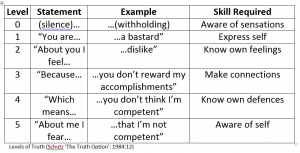Hi Everyone,
In the last blog (dated 10th July 2015) I posed the question:
…how often do we confuse behaviours with identity when we tell others what we think? How often do we say ‘I hate you’ when what we mean is ‘I hate it when you do that’?
But perhaps there is even more to this idea and its not just about a confusion between identity and behaviours. Perhaps, like Pinocchio, we also need to explore our levels of truthfulness.
Will Schutz (yes him again! He’s got so many great ideas) explores the idea of truthfulness in some detail. His belief is that the world will be a better place if we as individuals and as societies are more truthful with each other, and he offers three options for doing something with something that we know:
If we share what we know then we are being honest
If we know it but choose not to share it then we are withholding
If we know it but choose to share something contrary to what we know then we are lying
So to be truthful we have to be aware and then we have to share it: then we are being honest. Sometimes we are not aware, and often we are not honest! And this doesn’t only apply to what is going on around us of course, it also applies to our awareness of and truthfulness with ourselves.
The more self-aware we are the more we can understand truth at its deepest level. Because the reality is that whatever we share with someone else as a truth about them is actually saying something truthful about ourselves. Schutz describes this in the following chart (if you click on it it gets bigger!):
So when I say that I hate you I am at truthfulness level 1. If I have the self-awareness and am honest with myself I could realise the deeper truth is that, around you, there is something about me that I don’t like: perhaps the way I’m overlooked and feel insignificant, or that I try and score points at your expense, or that I feel less adequate because you are so competent, or that when you shout at me I don’t stand up for myself. Whatever it is, the ouch is about me, not about you. And that’s good news because if I own it then I can do something about it!
And we all have people in our lives (thank goodness!) around whom we feel good. We might say that we like or love them, but actually, it may also be that around them we like or love ourselves.
Schutz believes that 80% of relationship difficulties are created by a lack of truthfulness. But he is very clear that it’s not about telling everyone everything, as that wouldn’t be appropriate. His suggestion is that we are 1% more truthful as this will have a huge impact on developing more open and productive relationships. So if you’re thinking ‘should I or shouldn’t I tell them?’, then you always should.
And we can use this benchmark on ourselves too. If we are 1% more honest with ourselves then we may realise that the view that we are expressing about someone else is a level 1 truth, and perhaps we may want to work up to explore level 6: what we believe about ourselves when we are around that person. And once we have that level of honesty we give ourselves choices about how we feel when we meet that person next time.
What level of truthfulness do you work at? What would it be like to explore at the higher levels?
What would it be like if you were 1% more honest? What would being 1% more honest with others and with yourself do for you?
Thank you for reading this blog. I am enjoying sharing the Choose You Project with you and I love hearing your thoughts, comments and examples of Choose You moments, so do please continue to share them with me, (you can email me at jenny@insight-out.co.uk)
I’m taking a break from blogging for a few weeks over the summer, but look forward to sharing more Choose You ideas with you in September. Hope you have a great August,
Jenny

